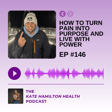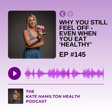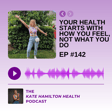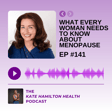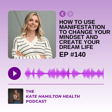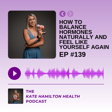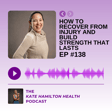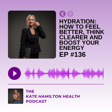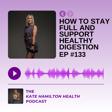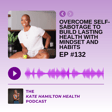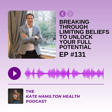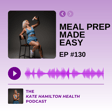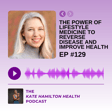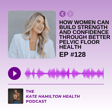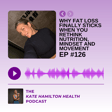
#134: Julianne Meade: What no one tells you about postpartum recovery
In this episode of The Kate Hamilton Health Podcast, I sit down with the brilliant Julianne Meade - registered nurse, clinical pain specialist, and founder of Barbells and Babies - for a chat all about the often-overlooked world of women’s health, particularly during and after pregnancy. From pelvic floor dysfunction to postpartum recovery, Julianne brings her clinical expertise and lived experience to the conversation, offering invaluable insights for any woman navigating motherhood.
We break down some of the myths around exercise during pregnancy, talk about the emotional and physical demands of postpartum life, and share practical tools to rebuild strength, confidence, and well-being. Whether you're newly pregnant, deep in postpartum recovery, or supporting a loved one, this conversation is full of holistic women’s health strategies, evidence-based tips, and relatable moments you won’t want to miss.
EPISODE HIGHLIGHTS:
[0:00] - Welcome & Introduction to Julianne Mead
[2:38] - Julianne’s personal journey: from nurse to women’s health advocate
[6:12] - The truth about postpartum recovery: what women aren't told
[9:03] - Pelvic floor health 101: why it matters more than you think
[14:13] - Easy, effective pelvic floor exercises to do at home
[20:44] - How I support women through health coaching at Kate Hamilton Health
[23:24] - The role of breath work in healing and strength training
[34:12] - Returning to CrossFit: what to know after pregnancy
[36:14] - Making workouts fun again: joy and motivation post-baby
[37:39] - Why community and connection matter for new moms
[40:06] - Navigating postnatal fitness safely and sustainably
[43:55] - Letting go of the “bounce back” pressure
[56:30] - Safe pregnancy exercise: tips, myths, and guidance
[1:03:31] - Final thoughts and where to find Julianne
Links & Resources:
- Connect with me on Instagram here
- Connect with Julianne on Instagram here
- Learn more about KHH coaching here
If you enjoyed this episode, please subscribe, leave a review, and share it with friends who might benefit. For more health and fitness tips, follow me on Instagram and TikTok @katehamiltonhealth.
Music b LiQWYD Free download: hypeddit.com/link/xxtopb [http://hypeddit.com/link/xxtopb] Promoted by FreeMusicPromo [https://www.youtube.com/channel/UCbycji-eySnM3WD8mbxPUSQ] / @freemusicpromo
